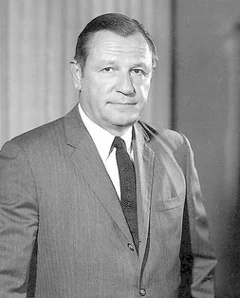John Abley was an Australian rules footballer who played with Port Adelaide in the South Australian National Football League (SANFL) between 1950 and 1961 died from cardiac arrest he was 81..
(1 October 1930 – 19 August 2011)
Abley spent some of the 1949 season playing reserves football with Hawthorn and turned his back on a possible career in the seniors when he moved to Adelaide. He could easily have played for Glenelg (as his younger brother Kevin did) instead of Port as after he arrived in Adelaide the area he planned on residing in was part of Glenelg's recruiting zone. Port Adelaide officials, at the suggestion of Bob McLean, hastily arranged alternate accommodation in the hope of acquiring his services and he debuted for them in 1950.
A fullback, Abley first played in that position for Port in a "Challenge match" in Broken Hill at the end of his debut season and after impressing was kept there for the remainder of his career. He was a member of the famed Port team which won six premierships in succession from 1954 to 1959, an Australian record.
He was a regular South Australian interstate representative and played a total of 23 games for his state. On three occasions he was selected as an All-Australian for his performances at the carnivals, in 1956, 1958 and 1961.
In 1959, John was named as a life member of the Port Adelaide Football Club because of his talent, his warmth off the field and being one of only six players to play in all of Port Adelaide's premierships in the 1950s (1951, 1954, 1955, 1956, 1957, 1958 and 1959).
In 1998, John was inducted to the South Australian Football Hall of Fame.
In 2001 Abley was named as the fullback in Port Adelaide's official "Greatest Team", taking into account all players to have represented the club since 1870.
Abley died on the 19 August 2011, aged 81, after a short illness.
To see more of who died in 2011 click here
(1 October 1930 – 19 August 2011)
Abley spent some of the 1949 season playing reserves football with Hawthorn and turned his back on a possible career in the seniors when he moved to Adelaide. He could easily have played for Glenelg (as his younger brother Kevin did) instead of Port as after he arrived in Adelaide the area he planned on residing in was part of Glenelg's recruiting zone. Port Adelaide officials, at the suggestion of Bob McLean, hastily arranged alternate accommodation in the hope of acquiring his services and he debuted for them in 1950.
A fullback, Abley first played in that position for Port in a "Challenge match" in Broken Hill at the end of his debut season and after impressing was kept there for the remainder of his career. He was a member of the famed Port team which won six premierships in succession from 1954 to 1959, an Australian record.
He was a regular South Australian interstate representative and played a total of 23 games for his state. On three occasions he was selected as an All-Australian for his performances at the carnivals, in 1956, 1958 and 1961.
In 1959, John was named as a life member of the Port Adelaide Football Club because of his talent, his warmth off the field and being one of only six players to play in all of Port Adelaide's premierships in the 1950s (1951, 1954, 1955, 1956, 1957, 1958 and 1959).
In 1998, John was inducted to the South Australian Football Hall of Fame.
In 2001 Abley was named as the fullback in Port Adelaide's official "Greatest Team", taking into account all players to have represented the club since 1870.
Abley died on the 19 August 2011, aged 81, after a short illness.
To see more of who died in 2011 click here









